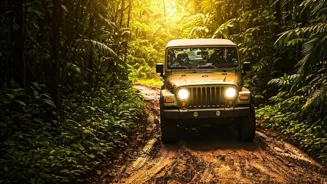Essential Documents Sorted
Before commencing your thrilling jungle safari, ensure your paperwork is in order. This includes vital documents such as a valid passport, which is mandatory
for identification if you're an international visitor. Indian citizens should carry their government-issued identity cards or driving licenses. Crucially, always retain copies of all essential documents, separate from the originals, as a precautionary measure against loss or theft. Furthermore, if you intend to capture memories through photography or videography, obtain any necessary permits that certain national parks or sanctuaries might mandate. Confirm any visa prerequisites and necessary vaccinations well ahead of the safari, too.
Booking Your Adventure
The initial step for a seamless safari experience involves securing your booking well in advance. Reserve accommodations, especially during peak season, to avoid disappointment. When it comes to safaris, it’s advisable to pre-book your safari rides and permits, especially if you are targeting a specific national park, such as Jim Corbett or Ranthambore. Engage with reputable tour operators who possess comprehensive knowledge about the region and the wildlife. They can provide valuable assistance with itinerary planning, suggesting the best times for viewing animals, and ensuring adherence to park rules. Consider the season and the wildlife you want to witness while planning the safari, which will influence your booking dates.
Selecting Accommodation Choices
Your choice of accommodation significantly impacts the overall comfort and enjoyment of your safari. National parks and their vicinity offer an array of lodging options, which vary according to budget and personal preferences. Depending on your preference, you can choose from luxury resorts providing all amenities, or budget-friendly lodges and homestays. Think about proximity to the park entrance and the amenities offered. If wildlife viewing is a priority, opt for accommodations that provide early morning safari access. Consider the climate and plan accordingly; certain seasons may require air conditioning or heating. Ultimately, the accommodation selection must align with your personal preferences to ensure a pleasant and restorative safari experience.
Choosing Safari Gear
Packing the right equipment is fundamental for a safe and engaging safari. Start by carrying comfortable, neutral-colored clothing that blends with the environment. This includes long-sleeved shirts and pants to guard against sun exposure and insect bites. Don’t forget sturdy hiking boots that can traverse rough terrain. A reliable pair of binoculars are indispensable for wildlife observation, and a camera with a powerful zoom lens can capture stunning images. Other key equipment consists of a hat, sunglasses, sunscreen, and insect repellent. A small backpack to carry your essentials, and a basic first-aid kit, including any personal medications, is important too. Prioritize practical items to enhance your comfort and preparedness during your jungle adventure.
Safari Transport Essentials
Selecting the appropriate mode of transport is crucial for a smooth and enriching safari experience. The primary option is typically a guided jeep safari, offering open-top seating for optimal wildlife viewing. These jeeps are usually operated by the park authorities or authorized tour operators. Ensure the vehicles are well-maintained and suitable for traversing challenging terrains. Consider private transport to customize your experience, although this may depend on park regulations. In some areas, walking safaris might be permitted. However, these are often conducted under expert supervision. Prioritizing the comfort and safety aspects during transport is essential for enjoying your jungle adventure.
Optimal Safari Timing
Strategically planning your safari's timing can maximize your chances of encountering wildlife. The dry season, normally from November to May, is usually optimal because the animals congregate near water sources. Early mornings and late afternoons are considered the most favourable times for viewing wildlife, as the animals are most active during these cooler periods. During the monsoon season, some parks might close due to difficult road conditions. Always check the specific park's operational schedule and best times for sightings before your safari. Planning your trip based on these seasonal and daily schedules will give you the best opportunities for memorable wildlife encounters.
Understanding Park Rules
Before you embark on your safari, familiarizing yourself with the specific park rules is crucial for a safe and responsible experience. Parks usually have strict guidelines concerning noise levels, as loud noises can disturb the animals. Ensure you follow your guide's instructions. Avoid littering and stick to marked paths to prevent disturbing the natural environment. Do not approach or feed any animals; maintain a safe distance at all times. Some parks may impose restrictions on photography, especially the use of flash. Violating the park regulations can lead to penalties and, more importantly, can disrupt the ecosystem. Observe all the instructions given by park officials to assist in preserving the environment.
Staying Safe on Safari
Safety should be a prime concern throughout your jungle safari. Always adhere to the guidance provided by your safari guide and follow their instructions without fail. Maintain a safe distance from wild animals, and do not attempt to feed them. Stay inside the vehicle during the safari unless you are specifically instructed to do otherwise. Inform someone about your itinerary and expected return time before leaving for the safari. Carry a basic first-aid kit with essential medical supplies, and be aware of the nearest medical facilities available in case of an emergency. Consider having an emergency contact readily accessible. By considering these measures, you'll enhance the safety of your jungle safari adventure.











